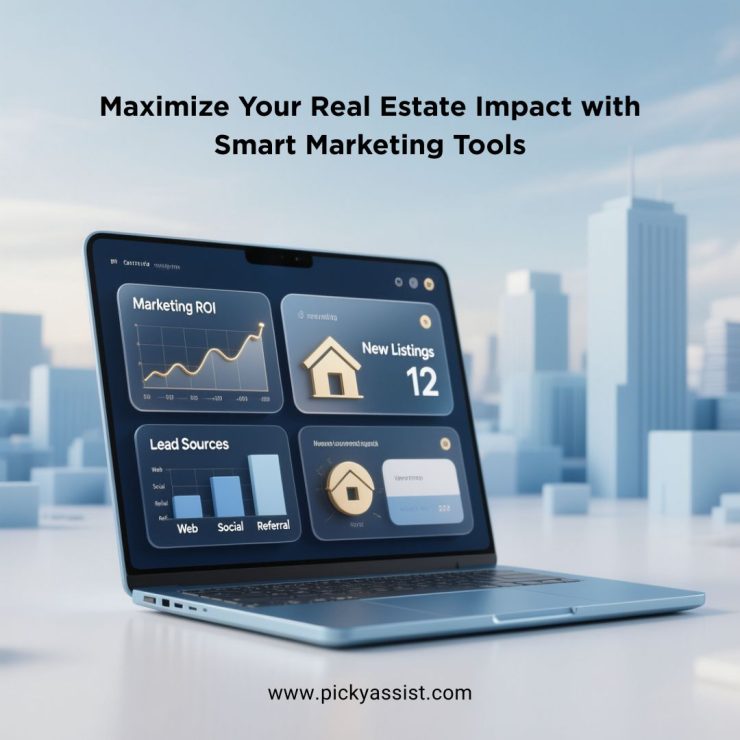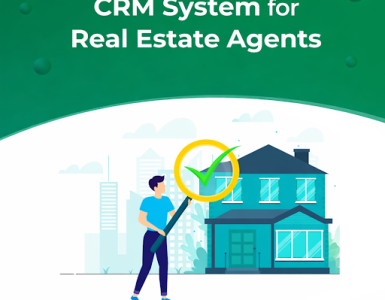A modern real-estate firm must engage prospects across channels, follow up flawlessly, and convert enquiries into deals, without relying on manual spreadsheets or scattered workflows. That’s where targeted real estate marketing tools come into play. When used properly, these tools enable smarter lead capture, faster responses and measurable growth. In this blog we’ll explore how you can leverage them, especially via a platform like Picky Assist, to build a robust marketing-and-sales machine.
Why Does Real Estate Need More Than Classic Marketing?
Traditional real-estate marketing (flyers, newspaper ads, open houses) still plays a role. But three key shifts have made standard approaches insufficient:
- Multi-channel lead entry – Leads can come via portals, social media direct messages, WhatsApp chats, website chatbots. Without centralisation, many slip through the cracks.
- Speed-to-lead matters – Studies show that when businesses use workflow automation, they see up to a 40% increase in lead conversion and a ~25% reduction in operational cost.
- Longer sales cycles & multiple touchpoints – Real-estate deals often span months: property shows, documentation, negotiations, follow-up. That means the agent needs to nurture relationships systematically.
What to Look for in the Right Real Estate Marketing Tools?
When evaluating your tech stack, here are the attributes you should check:
Lead Capture & Multi-Channel Ingestion
Ensure leads from property portals, website forms, Facebook/Instagram ads, WhatsApp and other messaging channels all funnel into one system. That’s the foundation for avoiding lead leakage.
→ A focused marketing tool for real estate agents bundle will support this out of the box.
Workflow Automation & Drip Sequences
Once a lead is in the system, you want to trigger follow-ups automatically: chatbots or WhatsApp messages qualify leads, schedule site visits, send reminder emails, etc. For example, a system may reduce lead-to-deal time by ~35% when automation is properly used. This aligns with the phrase real estate automated marketing.
Centralised CRM with Property-Specific Modules
Traditional CRMs track contacts and deals, but for real estate you need modules for listings, showings, site visits, closing documents. When you evaluate real estate CRM software you must check for this.
Drip Campaign & Nurture-Journey Support
Your prospects may not be ready to buy in 24 hours. Using a real estate CRM with drip campaign capability means you can set up a sequence of messages (WhatsApp, email) tailored over days/weeks based on engagement. This becomes one of the most effective components of realtor marketing tools.
Analytics, Reporting & Scalability
You must track what’s converting, what’s dropping off, which agent is responding fastest, etc. A solution that offers dashboards and supports growth without full migration is strong. When choosing a CRM for property management,make sure analytics are included.
Integration & No-Code Flexibility
Want to connect your portal feed, WhatsApp business chat, email campaigns? Platforms that allow connectors and no-code workflow builders accelerate deployment. For example, Picky Assist offers a drag-and-drop automation builder and supports over 3,000 app integrations.
How Picky Assist Enables Real Estate Marketing Tools in Action?
Let’s look at how the platform Picky Assist enables your agency to roll out and benefit from real estate marketing tools effectively.
- Unified lead funnel – Picky Assist collects leads from website forms, portals, WhatsApp chats, Facebook leads and routes them into a single dashboard.
- Automated qualification – A chatbot can ask key qualifying questions (budget, timeline, location) and automatically tag/score leads, then assign them to an agent using round-robin.
- Drip nurturing & follow-up – Once leads are captured, you can set up a sequence: WhatsApp message acknowledging the inquiry, email with property brochure, SMS reminder, calendar invite for site visit. As one case showed: follow-up within 24 hrs improved from 35% to 72% and site-visit scheduling jumped from 8% to 56% in three months.
- 360° view & analytics in CRM – Agents and managers can get a full view of each lead’s journey: initial touch, follow-ups, site visit, deal status. This transparency supports better decision-making and higher accountability.
- Scalable communication channels – Picky Assist isn’t just email; it integrates WhatsApp APIs, Instagram messages, Facebook leads, call-tracking and more. That means your commercial real estate marketing platform or residential brokerage has flexibility.
If you’re a real-estate broker or developer, adopting such a system means your team spends less time on admin and more time closing deals.
Benefits & Quantifiable Outcomes
By deploying the right set of real estate marketing tools, you can expect:
- Faster first-touch responses: In one case with Picky Assist, follow-up within 24 hours improved from 35% to 72%.
- Higher site-visit scheduling: From 8% to 56% in three months.
- Reduced manual effort: With automation you reduce repetitive tasks, freeing up agent time by (for example) ~50%.
- Improved lead conversion: Using automated drip sequences and multi-channel communication can reduce lead-to-deal time by ~35%.
- Better customer experience: With quick replies, consistent communication, and fewer missed leads, your brand reputation improves and referrals grow.
- Scalability without chaos: As you expand regionally or into commercial projects, the same best tools for realtors stack can scale without throwing out your system.
Implementation Road-Map: How to Get Started?
Here’s a practical blueprint to adopt these tools:
- Map your current lead flow: identify sources (portals, website, WhatsApp), hand-offs, follow-ups, reporting.
- Choose a stack that covers all key functions: lead capture, qualification, workflow automation, drip campaigns, analytics. Make sure you cover CRM software for real estate agents, Customer Relationship Management software for real estate.
- Configure your modules: listings, showings, leads, deals. Assign roles and automation rules (e.g., territory-based lead assignment).
- Build your nurturing sequences: e.g. Day 0: WhatsApp acknowledgement; Day 1: personalised property brochure; Day 4: video tour link; Day 7: site-visit reminder.
- Set KPIs and dashboards: speed-to-lead, site-visit scheduling %, conversion %.
- Train your team: ensure adoption, assign champions, monitor usage and follow-up.
- Scale and refine: as you gather data, tweak your sequences, scores, assignment rules and reporting.
- Continuously review ROI: compare manual process baseline vs. after automation to measure cost savings, time savings and additional revenue.
Conclusion
In essence, the right set of real estate marketing tools is not a luxury, it’s a strategic imperative. Agents and firms that continue to juggle spreadsheets, email threads and manual tasks risk missing opportunities and lagging behind more tech-savvy competitors. By adopting a well-designed platform like Picky Assist one that embodies realtor marketing tools, crm for property management, CRM tools for real estate, CRM software for real estate agents and the full suite of capabilities described you transform your marketing and sales engine. The result: faster responses, higher conversions, better customer experience, and scalable growth. If your goal is to stay ahead in the next 12-24 months, make this investment now, and let your marketing tools work for you, not the other way around.
FAQs on Real Estate Marketing Tools
Q1. What are the best tools for realtors to market properties effectively?
The best tools include a centralised lead-management system that consolidates portal, website and chat leads; automation workflows; drip sequences; multi-channel communication (especially WhatsApp); and analytics dashboards. Using real estate marketing tools such as the ones described here, agents reduce manual work and increase conversions.
Q2. How does real estate automated marketing impact lead conversion?
Automation ensures quicker first responses, consistent follow-up, and fewer leads falling through the cracks. For example, a workflow automation study reported a ~40% increase in conversion when leveraged correctly. By reducing manual tasks and standardising communication, your marketing tools for real estate agents become more effective.
Q3. What features should I look for in a real estate CRM software?
You should look for multi-channel messaging (including WhatsApp), lead capture & auto-assignment, listing/showing modules, drip campaign support, analytics/reporting, mobile access and integration flexibility. These features differentiate a true CRM system for real estate from a generic CRM.
Q4. Can I use a commercial real estate marketing platform for residential brokerage too?
Yes, Many platforms are modular and flexible. A commercial real estate marketing platform with robust CRM and automation can be adapted for residential if it allows customizing modules (listings, leads, contracts) and supports the channels your audience uses.







Add comment